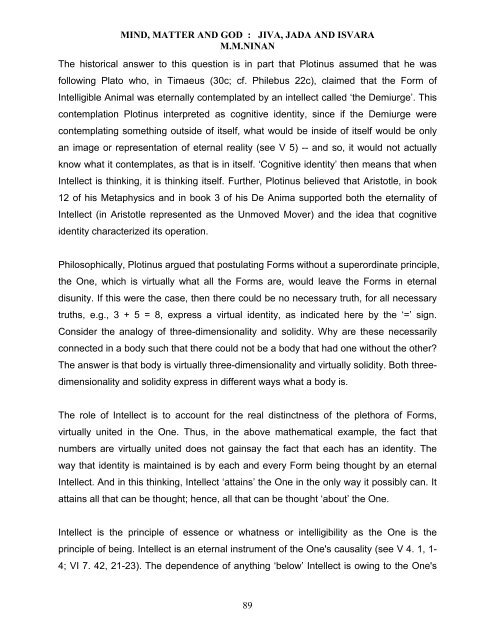Jiva
Create successful ePaper yourself
Turn your PDF publications into a flip-book with our unique Google optimized e-Paper software.
MIND, MATTER AND GOD : JIVA, JADA AND ISVARA<br />
M.M.NINAN<br />
The historical answer to this question is in part that Plotinus assumed that he was<br />
following Plato who, in Timaeus (30c; cf. Philebus 22c), claimed that the Form of<br />
Intelligible Animal was eternally contemplated by an intellect called ‘the Demiurge’. This<br />
contemplation Plotinus interpreted as cognitive identity, since if the Demiurge were<br />
contemplating something outside of itself, what would be inside of itself would be only<br />
an image or representation of eternal reality (see V 5) -- and so, it would not actually<br />
know what it contemplates, as that is in itself. ‘Cognitive identity’ then means that when<br />
Intellect is thinking, it is thinking itself. Further, Plotinus believed that Aristotle, in book<br />
12 of his Metaphysics and in book 3 of his De Anima supported both the eternality of<br />
Intellect (in Aristotle represented as the Unmoved Mover) and the idea that cognitive<br />
identity characterized its operation.<br />
Philosophically, Plotinus argued that postulating Forms without a superordinate principle,<br />
the One, which is virtually what all the Forms are, would leave the Forms in eternal<br />
disunity. If this were the case, then there could be no necessary truth, for all necessary<br />
truths, e.g., 3 + 5 = 8, express a virtual identity, as indicated here by the ‘=’ sign.<br />
Consider the analogy of three-dimensionality and solidity. Why are these necessarily<br />
connected in a body such that there could not be a body that had one without the other?<br />
The answer is that body is virtually three-dimensionality and virtually solidity. Both threedimensionality<br />
and solidity express in different ways what a body is.<br />
The role of Intellect is to account for the real distinctness of the plethora of Forms,<br />
virtually united in the One. Thus, in the above mathematical example, the fact that<br />
numbers are virtually united does not gainsay the fact that each has an identity. The<br />
way that identity is maintained is by each and every Form being thought by an eternal<br />
Intellect. And in this thinking, Intellect ‘attains’ the One in the only way it possibly can. It<br />
attains all that can be thought; hence, all that can be thought ‘about’ the One.<br />
Intellect is the principle of essence or whatness or intelligibility as the One is the<br />
principle of being. Intellect is an eternal instrument of the One's causality (see V 4. 1, 1-<br />
4; VI 7. 42, 21-23). The dependence of anything ‘below’ Intellect is owing to the One's<br />
89


















